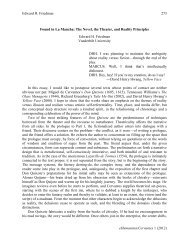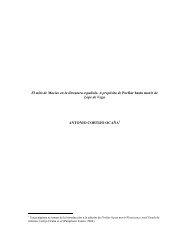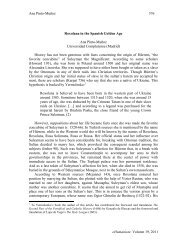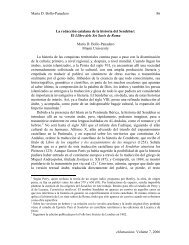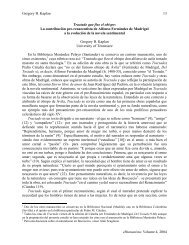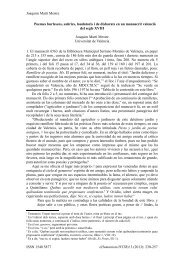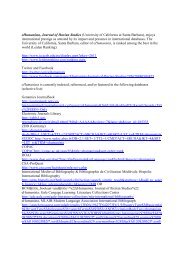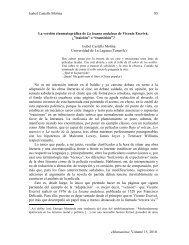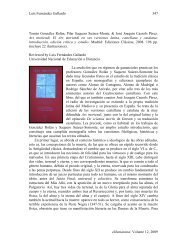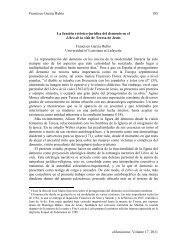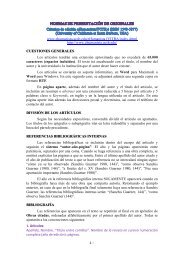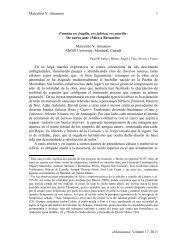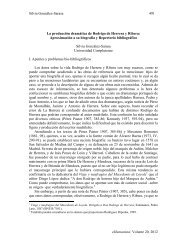Gregory Peter Andrachuk eHumanista: Volume 17, 2011 540 Alonso ...
Gregory Peter Andrachuk eHumanista: Volume 17, 2011 540 Alonso ...
Gregory Peter Andrachuk eHumanista: Volume 17, 2011 540 Alonso ...
Create successful ePaper yourself
Turn your PDF publications into a flip-book with our unique Google optimized e-Paper software.
<strong>Gregory</strong> <strong>Peter</strong> <strong>Andrachuk</strong><br />
Expanding the search a bit further we find that Rafael Torrent Orri, in an article on<br />
Bernardo de Villamarín, agrees with the information in the Diccionari Biogràfic<br />
linking Juan and Ramón as brothers: “Juana de Vilamarí...se casó con Juan de<br />
Cardona, hermano del virrey de Nápoles, a su vez, virrey de Calabria y más tarde<br />
Conde de Avellino...(que) murió en el año 1512” (68). It would be tempting indeed to<br />
be able to conflate all these claims because if Juan is definitely the brother of Antonio<br />
and if Juan is now claimed to be the brother of Ramón, and if Juan is (as Perea<br />
Rodríguez claims) the brother of the poet <strong>Alonso</strong> de Cardona, then it follows that<br />
<strong>Alonso</strong> de Cardona is also the brother of both Antonio, Marqués de la Pádula and of<br />
Ramón, Viceroy of Naples. The implications of such a relationship for my claim of<br />
<strong>Alonso</strong> de Cardona as author of Qüestión de amor would be very clear. It has been<br />
argued elsewhere that this is a work of social and political commentary (<strong>Andrachuk</strong><br />
1997) and that the author has kept his identity hidden because of the implied criticism<br />
of the Viceroy. If we could now prove that <strong>Alonso</strong> and Ramón are siblings, or at the<br />
very least related in some way, then any criticism by <strong>Alonso</strong> of his kinsman the<br />
Viceroy (for the excessive expenditures in preparation for, and the devastating results<br />
of the battle of Ravenna –a battle in which Juan de Cardona was mortally injured)<br />
could have grave social and familial consequences –and thus require that his identity<br />
be hidden.<br />
As attractive as the possibility of this sibling connection is, none of the<br />
information presented so far is conclusive except as regards the brothers Juan and<br />
Antonio. With respect to Ramón de Cardona’s relationship to the others we must first<br />
sift through the inconsistencies which often lead to a dead end. Perugini (26), for<br />
example, mentions the possibility that the Viceroy was the “hijo natural del rey<br />
Fernando el Católico” while Vigier (129, n.9) more reliably reports his parents as<br />
Antonio de Cardona and Castellana de Requeséns, the same parentage as listed by<br />
GeneAll and by the Diccionari Biorgràfic (1, 443); Juan Miguel Soler Salcedo (<strong>17</strong>1-<br />
72) lists the parents of Ramón as Juan Ramón Folch IV and Aldonza Enríquez –as is<br />
also claimed (confusingly) in the Diccionari Biogràfic (I, 455). This same source also<br />
lists a certain “Alfons”: “un dels fils del duc Joan Ramón Folc VI 18 i d’Aldonza<br />
Enríquez” (IV, 544) married to Aldonza Ferrer, 19 thereby inferring from the<br />
18 This is a typographical error for “IV”. The entry continues to state that this Alfons “Es casà amb<br />
Aldonça Ferrer. Apareix documentada la seva participació en un torneig...celebrat a Barcelona el 12 de<br />
juny de 1514.” As an example of the inconsistencies in reputable modern genealogical sources, Charles<br />
Cawley in Foundation for Medieval Genealogy (http://fmg.ac/Projects/MedLands/Catalan%20<br />
NOBILITY.htm) lists Juan Ramón Folch de Cardona and Aldonza Enríquez y Quiñones as having just<br />
one child, Fernando (21).<br />
19 Of this Alfonso, Aybar Ramírez says “Si se confirma, además, que <strong>Alonso</strong> es esposo de Aldonza<br />
Terrer (sic), hijo, por tanto, de Joan Folch de Cardona y Aldonza Enríquez, sería tío del escritor del<br />
Tratado notable, de Juan de Cardona” (57, n.5). This possibility cannot be entirely rejected for although<br />
virtually nothing further is known about this Cardona, if this information is correct then he would also<br />
be the brother of Aldonza, married to Miguel Jiménez de Urrea, brother of the author of Penitencia de<br />
amor. See infra n.39. <strong>Alonso</strong> (and its Catalan equivalent Alfons) and Alfonso were common variants<br />
548<br />
<strong>eHumanista</strong>: <strong>Volume</strong> <strong>17</strong>, <strong>2011</strong>



